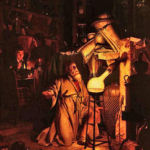 The age of Alchemy was much more pervasive than we realize from our modern view of charlatans or magicians wearing robes and pointed hats in the contemporary medieval fantasy literature and films. It was a predominant tradition on four continents for three plus centuries, sometimes dichotomous with and at other times intermingled with religion as mankind grappled with confusing nature and experience. Religion approached natural mystery with pious petition – entreating or bargaining with nature to control or intuit its directions. The alchemists wrestled with the underlying forces of nature – attempting to stand under them and achieve the desired control [understand]. We think of alchemy as the quest to change lead into gold. It makes sense why this was such a focus. Both are soft, malleable, easily melted metals. They differ only in availability and beauty. So close and yet so far – surely the transformation was just around the corner. The alchemists contributed to the science we now know as metallurgy – extracting metals from the earth, combining them, strengthening them. They happened upon a number of chemical reactions, but lacked any system to build on their findings.
The age of Alchemy was much more pervasive than we realize from our modern view of charlatans or magicians wearing robes and pointed hats in the contemporary medieval fantasy literature and films. It was a predominant tradition on four continents for three plus centuries, sometimes dichotomous with and at other times intermingled with religion as mankind grappled with confusing nature and experience. Religion approached natural mystery with pious petition – entreating or bargaining with nature to control or intuit its directions. The alchemists wrestled with the underlying forces of nature – attempting to stand under them and achieve the desired control [understand]. We think of alchemy as the quest to change lead into gold. It makes sense why this was such a focus. Both are soft, malleable, easily melted metals. They differ only in availability and beauty. So close and yet so far – surely the transformation was just around the corner. The alchemists contributed to the science we now know as metallurgy – extracting metals from the earth, combining them, strengthening them. They happened upon a number of chemical reactions, but lacked any system to build on their findings.
 We think of Alchemy as the harbinger of science. It was a discipline of hypotheses that lacked the scientific method of confirming hypthetical guesses, educated or otherwise. So there were among the different schools of alchemy layers of new hypotheses built on other unproven hypotheses – a medical science based on the four basic humors, a physical universe composed of mixtures of earth, air, fire, and water, a metallurgy based on the stellar constellations, etc. Alchemy died out slowly as it was replaced by experimentation and the variety of methodologies we use in modern science to confirm or refute the hypotheses that still pour from the human mind trying to stand under nature. But the Alchemic flaw of conflating possibility with truth is living and well all around us. Just stand at the herbal counter of your local health food store and listen.
We think of Alchemy as the harbinger of science. It was a discipline of hypotheses that lacked the scientific method of confirming hypthetical guesses, educated or otherwise. So there were among the different schools of alchemy layers of new hypotheses built on other unproven hypotheses – a medical science based on the four basic humors, a physical universe composed of mixtures of earth, air, fire, and water, a metallurgy based on the stellar constellations, etc. Alchemy died out slowly as it was replaced by experimentation and the variety of methodologies we use in modern science to confirm or refute the hypotheses that still pour from the human mind trying to stand under nature. But the Alchemic flaw of conflating possibility with truth is living and well all around us. Just stand at the herbal counter of your local health food store and listen.
 I’ve always thought that medical science remains more closely tied to its Alchemic roots than other sciences. Many remedies date to primitive trial and error herbal treatments. Medicine borrows much of its basic science from chemistry, physics, basic biology, any place that comes along that has something to offer. Many of our treatments were remedies long before their mechanisms were understood. And Medicine emerged from the other ancient healing arts not because of its advances in science, but because of its oath to do no harm – to put limits on therapeutic zeal. As time passed, the place of science became increasingly important – so safety and proven efficacy were woven into the fabric of medical treatments. Psychiatry, almost by definition, remains closer to the edge of science than any other medical specialty. When an illness is understood, it’s handed over to physical medicine – epilepsy, neurosyphilis, Myxedema madness, Cushing’s depression, toxic encephalopathy, Pernicious Anemia, etc.
I’ve always thought that medical science remains more closely tied to its Alchemic roots than other sciences. Many remedies date to primitive trial and error herbal treatments. Medicine borrows much of its basic science from chemistry, physics, basic biology, any place that comes along that has something to offer. Many of our treatments were remedies long before their mechanisms were understood. And Medicine emerged from the other ancient healing arts not because of its advances in science, but because of its oath to do no harm – to put limits on therapeutic zeal. As time passed, the place of science became increasingly important – so safety and proven efficacy were woven into the fabric of medical treatments. Psychiatry, almost by definition, remains closer to the edge of science than any other medical specialty. When an illness is understood, it’s handed over to physical medicine – epilepsy, neurosyphilis, Myxedema madness, Cushing’s depression, toxic encephalopathy, Pernicious Anemia, etc.

There is a distinct subset of today’s pool of biological psychiatrists that seem to me more Alchemists than Scientists. I expect the same subgroups have been present in any discipline involved in matters mental health – including the psychoanalysts, psychologists, etc. That’s to be expected, I suppose, because of the complexity of the topic and the state of our understanding. But how can one distinguish Alchemist from Scientist? It’s a reasonable and important question. Scientists are skeptical and tentative. Alchemists are neither, rather coming off as enthusiastic and optimistic – salesmen who opportunize on any finding. Scientists tend to stick to what is known [the past] or a bit beyond. Alchemists live in the future, the possibilities just around the corner. Scientists look for hard proof, something on a higher order than simple statistics. Alchemists delight in ‘signals‘ or ‘signs.’ ‘Approaching significance‘ is a valid thing for an Alchemist to say. A characteristic sign of Alchemy is to confuse assumptions with fact, and to create towers of hypothesis constructed from other hypotheses with little or no solid proof of anything along the way. Another sign of a regression to the ways of the Alchemist is that while there are studies all around, there are no connecting threads, no emerging lines of thought that become increasingly clear over time. And many studies seem more tied to some technology than to a basic question or hypothesis. Alchemy is haphazard, chaotic, promising but never quite delivering, jumping in any new direction, prone to flights into fantasy.
Science? Or Alchemy? How about commercially driven hand waving? The two links don’t give any performance data at all for the individual genes, much less any analyses of gene interactions. And what can be proprietary about 10 genes that were all discovered with public research funding independently of this corporation? Oh, and I couldn’t find any mention of the pricing.
Psychoanalysis has more than a whiff of alchemical hypothesizing without validating experimentation to me…